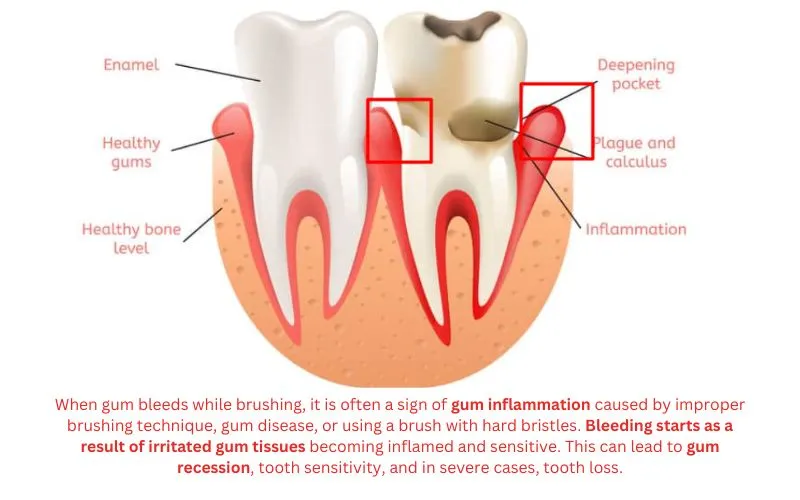Experiencing bleeding gums while brushing can be disconcerting. Often dismissed as a minor inconvenience, this symptom may signify underlying oral health issues that require attention. Understanding the potential causes and the appropriate responses is essential for optimal oral health.
Common Causes of Bleeding Gums
Bleeding gums can be attributed to several factors, varying in severity and impact on oral health. Understanding these causes is essential for addressing and preventing this common issue.
Poor Oral Hygiene
Neglecting proper oral hygiene is one of the primary culprits behind bleeding gums. When brushing and flossing are inadequate, bacterial plaque accumulates along the gumline.
This sticky, colorless film harbors bacteria that can irritate and inflame the gums, leading to bleeding. Consistent failure to remove plaque allows it to harden into tartar, further exacerbating the problem and making professional intervention necessary.
Gingivitis
Gingivitis is an early stage of gum disease characterized by gum inflammation. Poor oral hygiene typically leads to this condition. Symptoms of gingivitis include red, swollen gums that bleed easily during brushing or flossing. While gingivitis is reversible with proper oral care, ignoring it can result in more severe periodontal diseases, posing a risk to overall oral health
Gingivitis is a prevalent condition and represents the initial stage of gum disease. It is characterized by inflammation of the gums, often leading to redness, swelling, and bleeding. This condition is primarily caused by the accumulation of bacterial plaque at the gumline. If left untreated, gingivitis can progress to more severe forms of periodontal disease.
Plaque and Tartar
Plaque’s continual formation on teeth is a natural process, but inadequate removal can cause it to harden into tartar. This calcified plaque creates a rough surface on teeth, facilitating further plaque accumulation and making it difficult to maintain clean gums. Tartar irritates the gums, leading to persistent inflammation and bleeding, necessitating professional dental cleaning to eliminate it.
Improper Brushing Techniques
Using incorrect brushing techniques can also contribute to gum bleeding. Aggressive brushing with a hard-bristled toothbrush can damage the delicate gum tissue, causing irritation and bleeding. Using a soft-bristled toothbrush and employing gentle, circular motions is essential to clean teeth effectively without harming the gums.
Additionally, improper flossing, such as snapping the floss into the gums, can cause trauma and subsequent bleeding. Choosing the right type of toothbrush—whether manual or electric—is also important to suit your needs and ensure thorough cleaning. Neglecting to brush your teeth regularly can lead to the buildup of plaque and tartar, exacerbating gum problems and increasing the risk of bleeding.
Systemic Health Issues
Certain systemic health conditions can influence gum health, making them more susceptible to bleeding. Diabetes impairs the body’s ability to fight gum infections, leading to increased gum inflammation and bleeding.
Leukemia, a type of cancer, can also cause gum bleeding due to the body’s reduced ability to clot blood and fight infections. Hormonal changes during pregnancy or menopause can make gums more sensitive and prone to bleeding. Conditions like vitamin deficiencies (especially vitamin C and K) can weaken gum tissues, leading to increased bleeding.
What Happens When Gum Bleeding Starts
When plaque and food debris are not properly removed, bacteria irritate the gums, causing them to bleed. This can be exacerbated by factors like brushing too hard, vitamin deficiencies, or certain medications. If left untreated, gingivitis can progress to periodontitis, where the gums pull away from the teeth, forming pockets that become infected.

Medications
Some medications can have side effects that impact oral health, including causing gums to bleed. Anticoagulants or blood thinners, such as warfarin, reduce the blood’s ability to clot, making gums more likely to bleed even with minimal irritation.
Antihypertensive medications can cause gum overgrowth, leading to increased bleeding. It is crucial for individuals taking such medications to inform their dentist to receive appropriate care and advice.
Lifestyle Factors
Certain lifestyle choices also play a significant role in gum health. Smoking and the use of other tobacco products can impair gum tissue healing, increase plaque buildup, and reduce blood flow to the gums, all of which can lead to bleeding. A diet lacking essential nutrients, particularly vitamins and minerals vital for gum health, can weaken the gums and increase susceptibility to bleeding.
The Importance of Proper Brushing and Flossing Techniques
Adopting the correct brushing and flossing techniques is crucial in preventing gum bleeding. Using a toothbrush with soft bristles and brushing gently in circular motions is recommended. Flossing should be done carefully to avoid injuring the gums. Ensuring thorough cleaning of the teeth and gums can significantly reduce the risk of bleeding.
When to Seek Professional Help
While occasional gum bleeding may not be alarming, persistent or severe bleeding warrants professional evaluation, dental professionals can diagnose underlying conditions and recommend appropriate treatments. Ignoring persistent gum bleeding can lead to more severe dental issues, such as periodontitis, and affect overall health.
Periodontitis is a serious gum infection that damages the soft tissue and, if untreated, can destroy the bone that supports your teeth. This can lead to tooth loss and has been linked to other health problems, including cardiovascular disease and diabetes. Seeking timely professional advice ensures that any underlying issues are addressed promptly, preventing further complications and promoting long-term oral health. Regular dental check-ups and cleanings are vital in monitoring and maintaining the health of your gums.
Preventative Measures and Treatments
Preventing and treating bleeding gums requires a multi-faceted approach focusing on oral hygiene practices and overall health. Here are detailed steps to maintain healthy gums and prevent bleeding:

- Maintain Good Oral Hygiene
- Brush Twice Daily: Use a soft-bristled toothbrush and brush for at least two minutes to cover all areas, including the gumline.
- Floss Daily: Proper flossing removes plaque and food particles between teeth and below the gumline, areas your toothbrush can’t reach.
- Use an Antimicrobial Mouthwash: Rinse with an antimicrobial mouthwash to reduce bacteria and plaque buildup. This can help in reducing gum inflammation and bleeding.
- Balanced Diet Rich
- Vitamin C: Ensure your diet includes foods rich in oral hygiene vitamins like vitamin C (such as citrus fruits, strawberries, and bell peppers) to promote healthy gums and prevent bleeding.
- Vitamin K: Incorporate foods high in vitamin K (like leafy green vegetables, broccoli, and Brussels sprouts), which is crucial in blood clotting and gum health.
- Stay Hydrated
- Drink Plenty of Water: Water helps wash away food particles and bacteria from your mouth, reducing the risk of gum disease. It also helps keep your mouth hydrated and supports overall oral health.
- Manage Stress
- Reduce Stress Levels: High-stress levels can weaken your immune system and make you more susceptible to gum infections. Practice stress management techniques like exercise, meditation, or hobbies to maintain oral and general health.
- Use Fluoride Toothpaste
- Fluoride Protection: Use toothpaste that contains fluoride to help strengthen tooth enamel and reduce the risk of decay that can affect gum health.
- Natural Remedies
- Salt Water Rinse: Rinsing your mouth with warm salt water can help reduce gum inflammation and promote healing.
- Tea Tree Oil: Consider using toothpaste or mouthwash containing tea tree oil, which is known for its antibacterial properties.
These preventative measures and treatments can significantly reduce the risk of bleeding gums and improve overall gum health. Consistency in these practices is key to maintaining a healthy, beautiful smile and preventing serious dental issues./
Conclusion
Bleeding gums while brushing should never be ignored. Recognizing the causes and implementing proper oral care routines can prevent serious dental issues. Regular visits to the dentist and adopting a holistic approach to health can ensure that your gums remain healthy and free from bleeding. Prioritizing oral hygiene is not only crucial for a beautiful smile but also for overall well-being.

Dr. Orion Johnson is a dedicated and compassionate dentist committed to providing exceptional dental care to his patients.Dr. Johnson obtained his Doctor of Dental Surgery (DDS) degree from a prestigious dental school, where he excelled academically and clinically. He is licensed to practice dentistry and stays updated with the technology through continuing education and training.
